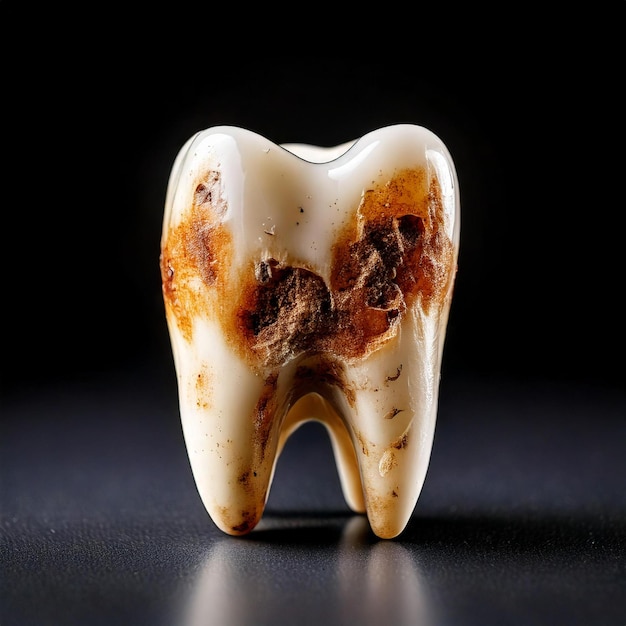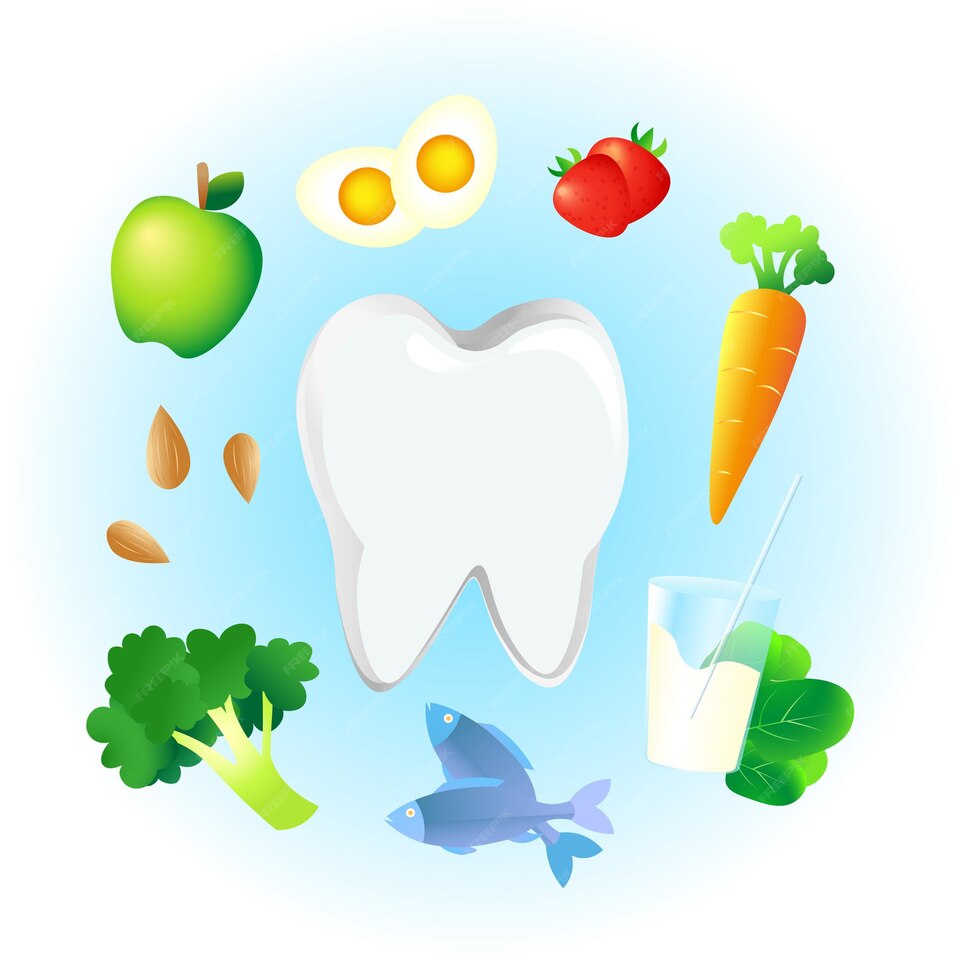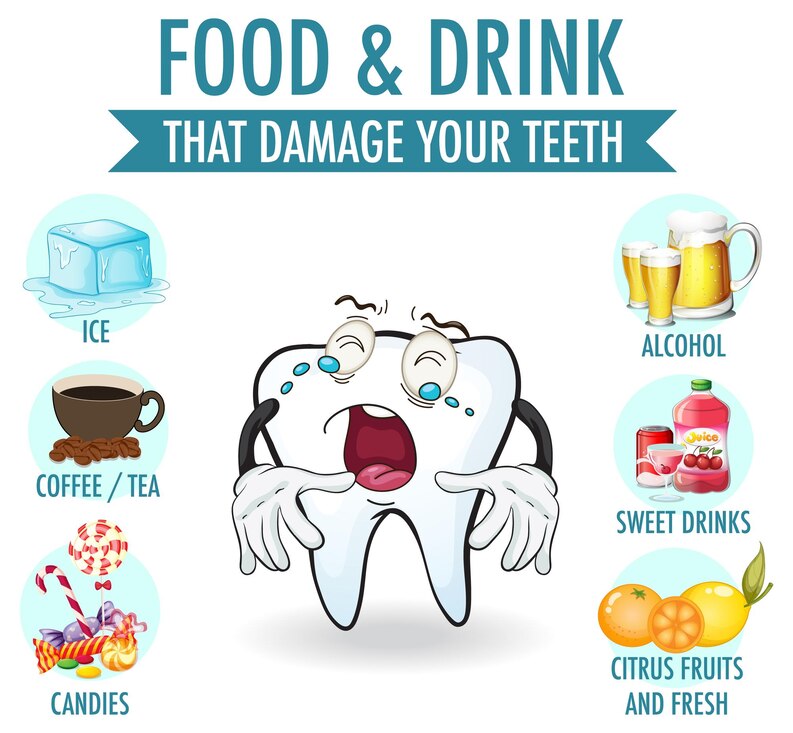Dental health is key to our overall well-being, especially for Tooth Cavities. Yet, nearly 3.5 billion people worldwide suffer from oral diseases. Tooth Cavities are one of the most common issues.
A cavity, also known as tooth decay, happens when bacteria break down food, especially sugars, in our mouths. This leads to the weakening of tooth enamel.

It’s important to know why Tooth Cavities happen and how to stop them. This article will explore the reasons behind Tooth Cavities and share ways to prevent them.
Key Takeaways
- Tooth decay is a major oral health issue globally.
- Tooth Cavities are caused by bacterial activity in the mouth.
- Prevention involves good oral hygiene practices.
- Diet plays a significant role in the development of Tooth Cavities.
- Regular dental check-ups are crucial for early detection.
What is a Tooth Cavity?
Tooth decay, or a cavity, is a damaged area in a tooth’s surface. It happens due to poor oral care and diet.
Keeping your mouth clean is key to avoiding Tooth Cavities. Noorident Clinic says brushing and flossing regularly can stop plaque and tartar. This greatly lowers cavity risk.
Definition of a Tooth Cavity
A dental cavity is a hole in a tooth from bacterial infection. Bacteria in your mouth break down sugars, making acid. This acid harms the enamel, causing Tooth Cavities.
How Tooth Cavities (Dental Caries) Develop in the Mouth
Tooth Cavities form when tooth enamel demineralizes. Bacteria breaking down sugars produce acid. This acid damages the enamel, creating a hole.
If not treated, the cavity can grow through the enamel and dentin. It might even reach the tooth’s pulp.
Poor oral hygiene, eating too much sugar, and not enough fluoride can speed up cavity formation.
Common Tooth Cavity Symptoms to Watch For
Spotting Tooth Cavities symptoms early can prevent bigger issues. Common signs include:
- Toothache or pain when biting or chewing
- Sensitivity to hot or cold temperatures
- Visible holes or discoloration on the teeth
- Pain when eating sweet foods or drinks
Regular dental visits can catch Tooth Cavities early, even before symptoms show.
Top Risk Factors That Lead to Tooth Cavities (Tooth Decay)
Tooth decay is caused by many factors. Knowing these helps prevent and manage Tooth Cavities.
How Age and Oral Hygiene Impact Tooth Cavities
Age affects cavity risk. Kids’ teeth are more prone because their enamel is thinner. Older adults face risks from receding gums and dry mouth, often from medication. Proper oral hygiene is key for all ages to avoid Tooth Cavities.
Diet and Nutrition
What you eat matters a lot. Foods high in sugar and stickiness raise decay risk. It’s not just how much you eat, but how often. Noorident Clinic says cutting down on sugary foods helps prevent Tooth Cavities. Eating foods rich in calcium and fluoride strengthens teeth against decay.

Medical Conditions
Some health issues raise cavity risk. Dry mouth (xerostomia) makes teeth more vulnerable because saliva helps fight acids. Gastroesophageal reflux disease (GERD) can also erode teeth and increase cavity risk.
| Risk Factor | Description | Preventive Measure |
|---|---|---|
| Age | Children and older adults are more susceptible. | Regular dental check-ups. |
| Diet | Sugary and sticky foods increase risk. | Balanced diet, limit sugary foods. |
| Medical Conditions | Dry mouth, GERD can increase risk. | Manage condition, regular dental visits. |
Early Detection of Tooth Cavities: How to Spot the Signs
Regular monitoring is key to catching Tooth Cavities early. Noorident Clinic says regular dental check-ups are vital for early detection and treatment. This approach helps prevent cavities from getting worse, avoiding complex treatments.
To learn more on How to Identify Tooth Cavities Early click here…..
Dental Check-Ups
Dental check-ups are crucial for oral health. Dentists can spot Tooth Cavities early, often before symptoms show. Early detection means simpler treatments, like fluoride or fillings, not root canals.
Visiting the dentist regularly is a good idea. They can give you advice on getting more fluoride and other preventive steps for your oral health.
At-Home Self-Examinations
At-home checks are also important. Regularly checking your teeth and gums can reveal Tooth Cavities early. Being proactive about your oral health helps catch Tooth Cavities before they get worse.
| Signs to Look For | Description | Action to Take |
|---|---|---|
| Tooth Discoloration | White, brown, or black spots on teeth | Consult a dentist for an evaluation |
| Sensitivity | Pain when consuming hot or cold foods/drinks | Discuss sensitivity with your dentist |
| Gum Changes | Redness, swelling, or bleeding gums | Improve oral hygiene habits and visit a dentist |
Combining dental check-ups with at-home checks boosts your chances of finding Tooth Cavities early. This two-step approach is essential for good oral health and preventing serious problems.
Oral Hygiene and Tooth Cavity Prevention: What You Need to Know
Good oral hygiene is key to preventing tooth decay. Keeping up with a strict oral hygiene routine is crucial. It involves several practices that work together to keep your teeth clean and healthy.
Proper Brushing Techniques to Prevent Tooth Cavities
Brushing your teeth is essential for oral hygiene. Use a fluoride toothpaste and a soft-bristled toothbrush. Brush for at least two minutes, twice a day, making sure to cover all surfaces of your teeth. Focus on the areas where your teeth and gums meet, as plaque often builds up here.
Effective brushing removes plaque, a sticky film of bacteria, from your teeth. If not removed, plaque can cause cavities and gum disease. Using an electric toothbrush can be more efficient at removing plaque than a manual toothbrush.
Why Flossing Is Essential in Tooth Cavity Prevention
Flossing is also crucial for oral hygiene. It uses a thread of floss to remove food particles and plaque from between your teeth and under your gumline. Daily flossing can significantly reduce the risk of cavities and gum disease.
To floss effectively, wrap the floss around your middle fingers, leaving about an inch or two of floss in between. Gently slide the floss between your teeth, curving it around the edge of each tooth in a “C” shape. This helps to remove plaque and debris that can get stuck.

Mouthwash and Its Benefits
Using mouthwash can be a valuable addition to your oral hygiene routine. Mouthwash can kill bacteria that cause Tooth Cavities and gum disease, reduce plaque, and prevent gingivitis. Some mouthwashes also contain fluoride, which can help strengthen tooth enamel.
When choosing a mouthwash, look for one with the American Dental Association (ADA) Seal of Acceptance. This indicates it meets dental professionals’ standards for safety and effectiveness. Swish the mouthwash around your mouth for 30 seconds to 1 minute before spitting it out.
| Oral Hygiene Practice | Benefits | Frequency |
|---|---|---|
| Brushing | Removes plaque, prevents Tooth Cavities and gum disease | Twice a day |
| Flossing | Removes food particles and plaque from between teeth and under the gumline | Daily |
| Mouthwash | Kills bacteria, reduces plaque, and prevents gingivitis | Once or twice a day |
How Dietary Choices Affect Tooth Cavity Formation
Tooth cavities are a common problem. They are greatly affected by what we eat and drink every day. Eating foods and drinks high in certain types can cause cavities.

Sugary Foods and Drinks
Sugary foods and drinks are big culprits in tooth decay. The bacteria in our mouths eat sugar and make acid. This acid damages tooth enamel and can cause cavities. It’s important to cut down on sugary snacks and drinks to avoid Tooth Cavities.
Importance of Calcium and Fluoride
Calcium and fluoride are key for healthy teeth. Calcium makes tooth enamel strong, and fluoride helps teeth resist acid. Eating foods rich in calcium like dairy and leafy greens, and using fluoride toothpaste, helps a lot with oral health.
Healthier Snack Alternatives
Choosing better snacks can help stop Tooth Cavities. Fresh fruits, veggies, and nuts are great instead of sugary snacks. These snacks are good for our teeth and overall health.
Here’s a look at different snacks and how they affect our teeth:
| Snack Type | Oral Health Impact | Recommendation |
|---|---|---|
| Sugary Snacks | High risk of Tooth Cavities | Limit consumption |
| Fresh Fruits and Vegetables | Low risk, high in fiber | Encouraged |
| Nuts and Seeds | Low risk, rich in calcium | Recommended in moderation |
The Impact of Tooth Cavities on Overall Health
Decayed teeth can affect your health in big ways, like heart disease and digestive issues. The link between your mouth and overall health is strong. Research shows that there’s a big connection between the two.
Connection to Heart Disease
Research shows a link between poor oral health and heart disease. Bacteria from Tooth Cavities can cause inflammation in the body. This inflammation is a risk factor for heart disease.
These bacteria can spread to other parts of the body, causing infections. For example, some oral bacteria can lead to atherosclerosis. This is when plaque builds up in the arteries.
| Oral Health Condition | Potential Impact on Heart Health |
|---|---|
| Poor Oral Hygiene | Increased Risk of Cardiovascular Disease |
| Gingivitis | Inflammation Contributing to Atherosclerosis |
| Decayed Teeth | Bacterial Spread and Systemic Infection |
Effects on Digestion
Your mouth’s health is tied to your digestive health. Tooth Cavities symptoms can make chewing hard, leading to digestive problems. This is because food isn’t broken down well.
The pain from decayed teeth can also change your diet. You might eat softer, higher carb foods. This can affect your digestion and how well you absorb nutrients.
Regular dental care is key to preventing these problems. It helps keep your teeth clean and reduces risks of heart disease and digestive issues.
Treatment Options for Tooth Cavities
It’s important to know how to treat tooth cavities to keep your teeth healthy. Cavities, or dental caries, are common and can lead to bigger problems if not treated. Luckily, there are many treatments, from simple steps to more complex ones.
Fillings and Restorations
Fillings are a common way to fix Tooth Cavities. The dentist removes the decay and fills it with materials like amalgam, gold, or composite resin. The choice depends on the decay’s size, the tooth’s location, and what you prefer.
For bigger damage, you might need restorations like inlays, onlays, or crowns. These are custom-made to fit your tooth and help it look and work like new.
Root Canals Explained
If the decay reaches the tooth’s pulp, a root canal might be needed. This involves removing the infected pulp, cleaning the canal, and sealing it. It’s a way to save a tooth that would otherwise need to be pulled.
Many people worry about root canals, but they’re very effective. They can stop pain and help keep your teeth healthy. For more on oral health myths, check out this article that busts common lies.

Preventive Treatments: Sealants
Preventing cavities is better than treating them. Dental sealants can help protect your teeth. They’re thin coatings applied to teeth, especially molars, to stop decay.
Sealants act as a barrier, keeping bacteria and food out of your enamel. This simple procedure can greatly lower your risk of cavities, especially for kids.
| Treatment | Description | Benefits |
|---|---|---|
| Fillings | Removing decay and filling with material | Restores tooth function, prevents further decay |
| Root Canal | Removing infected pulp and sealing the canal | Saves the tooth, alleviates pain |
| Sealants | Applying a protective coating to teeth | Prevents Tooth Cavities, easy to apply |
Myths and Facts about Tooth Cavities
It’s important to know the truth about tooth cavities. Many people have wrong ideas about what causes them and how to stop them.
The Truth About Sugar
Many think sugar is the only thing that causes Tooth Cavities. But, it’s not the only thing. The way and how long you eat sugar matters a lot. So does how well you clean your teeth.
Dr. Jane Smith, a famous dentist, said something important.
“The real culprit behind tooth decay is not sugar itself, but the acid produced by oral bacteria when they feed on sugar.”
This shows how important it is to know about bacteria in your mouth.
Misconceptions about Dental Visits
Some people think dental visits are only for fixing problems. But, regular dental visits are key to catching Tooth Cavitiesearly. Dentists can spot cavities when they’re easy to fix and teach you how to keep your teeth clean.
Many think dental visits cost too much. But, preventive care is cheaper than fixing big problems. Plus, many dental plans cover routine visits and cleanings, making them more affordable.
Knowing the truth about Tooth Cavities helps you keep your teeth healthy. This means watching your sugar intake, brushing and flossing well, and seeing the dentist often.
The Importance of Regular Dental Visits
Regular dental visits are key to keeping your mouth healthy. Dentists in Nairobi say these visits do more than just check for Tooth Cavities. They give a full look at your oral health.
What to Expect During a Check-Up
At a dental check-up, you’ll get a detailed look at your teeth and gums. This includes a dental cleaning to remove plaque and tartar. These can cause Tooth Cavities and gum disease.
The dentist will also look for any oral health problems. They’ll teach you how to keep your mouth clean. They might suggest a dental wash to make your mouth even cleaner.
In Nairobi, finding teeth cleaning services is easy. Many clinics offer full dental care packages.
How Often Should You Go?
How often you should visit the dentist depends on several things. This includes your current oral health, risk for disease, and how well you take care of your teeth. Most dentists say you should go every six months for a check-up and cleaning.
But, some people might need to go more often.
| Procedure | Benefit |
|---|---|
| Dental Cleaning | Removes plaque and tartar, reducing the risk of Tooth Cavities and gum disease |
| Oral Examination | Early detection of oral health issues |
| Guidance on Oral Hygiene | Helps maintain good oral hygiene practices |
| Dental Wash | Enhances oral cleanliness and freshness |
Innovative Technologies in Cavity Detection
Dental technology has changed how we find and fix Tooth Cavities. New tools in dental offices have made finding cavities more accurate and treatments better. This part will look at digital X-rays and laser cavity detection.
Benefits of Digital X-Rays
Digital X-rays are key in today’s dentistry. They show more detail and are safer than old X-rays. They give a clear view of teeth, helping dentists spot cavities early. They also cut down on radiation and make it easy to share images.
Using digital X-rays often means finding cavities sooner. This can mean less complex treatments later. It also helps plan how to stop cavities from getting worse.
Laser Cavity Detection
Laser cavity detection is becoming more common. It uses a laser to find cavities by looking at tooth changes. Laser detection is very accurate and doesn’t hurt. It’s also good for checking teeth health over time.
Laser tech is great for tracking tooth changes. It helps catch problems early. Using lasers with digital X-rays gives a full view of teeth health.
Knowing about these techs helps us understand how to keep teeth clean. Regular dental visits, which might include these tools, are key for good oral health. They might cost more, but they’re worth it for your teeth.
Conclusion: Keeping Your Smile Healthy
To keep your smile healthy, you need good oral hygiene, regular dental visits, and a balanced diet. Knowing why cavities happen and taking steps to prevent them can greatly lower your risk.
Maintaining Oral Health
Brushing, flossing, and using mouthwash are key to stopping cavities. The cost of dental cleaning and mouthwash in Kenya can change. But, these habits can save you money by avoiding expensive treatments.
Healthy Habits for a Healthy Smile
Healthy habits like eating less sugar, going to the dentist often, and using fluoride toothpaste help protect your teeth. Keeping an eye on dental cleaning and mouthwash prices in Kenya helps plan for your oral care.
FAQ
What causes cavities in teeth?
Cavities come from poor oral hygiene, a diet full of sugar, and some health issues. Bacteria in our mouths break down food, especially sugars. This makes acid that can harm tooth enamel and cause cavities.
How can I identify Tooth Cavities early?
Spotting Tooth Cavities early means regular dental visits and self-checks at home. Look for tooth sensitivity, discoloration, or holes in teeth. Dental check-ups can catch cavities before you notice symptoms.
What is the role of oral hygiene in preventing Tooth Cavities?
Good oral hygiene is key to avoiding cavities. Brushing right, flossing, and using mouthwash remove plaque and bacteria. This strengthens your teeth.
How do dietary choices impact cavity development?
What you eat affects cavities. Sugary foods and drinks raise the risk, but calcium and fluoride strengthen teeth. Choosing better snacks can help prevent cavities.
How can I remove plaque and tartar from my teeth?
To remove plaque and tartar, mix good oral care with dental cleanings. Brushing and flossing daily can get rid of plaque. For tartar, a dentist is needed. Tartar removers or electric toothbrushes can also help.
What are the symptoms of Tooth Cavities?
Signs of cavities include toothache, sensitivity, and visible decay. If you notice these, see a dentist for a diagnosis and treatment.
How often should I visit the dentist for a check-up?
Dental visits depend on your oral health. Most people need a check-up every six months. But, some may need more often based on their health.
What are the benefits of digital X-rays in cavity detection?
Digital X-rays are better for finding cavities. They’re more accurate, use less radiation, and give quicker results. This lets dentists treat cavities early, even before symptoms show.
How can I prevent Tooth Cavities through my diet?
To prevent cavities, eat less sugar and more calcium-rich foods. Use fluoride toothpaste or mouthwash. Choose snacks like fruits and veggies instead of sweets.
What is the connection between Tooth Cavities and overall health?
Research links Tooth Cavities to heart disease and digestion issues. Keeping your teeth healthy is important for your overall well-being.